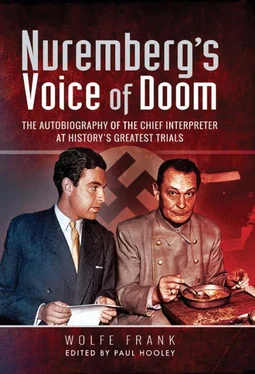Not many people in England, so it seemed, knew that this was, indeed, one of the most beautiful operettas of all times – household word, ever-green, call it what you like.
To Skeffington, it was ‘a thing to do’. To Humphrey it had become, of necessity, a cause worthy of salvation. Skeffington, the worst stutterer I had ever encountered, had also assured Humphrey that to drop his option on Maritza would be tantamount to ‘killling the goose that would lay the golden egg.’
There was some sort of deadline on the day when I was lunching at the Landsdowne Club [2] The Lansdowne Club is a private London club that was established in 1935. It is located in Berkeley Square.
in Mayfair with Humphrey, for Skeffington to exercise his option – and somewhere, some bank manager was deciding at that very moment whether the Sykes/Skeffington combine was worthy of additional credit. I remember Humphrey trotting out a chessboard and offering to teach me the game while we waited for the good word. Then the bank called. Humphrey could have £5,000 more as an overdraft, ‘If he would put all his assets in hock’. He did, and we had Countess Maritza. More precisely, since Humphrey’s presence was urgently required in Florida, Maritza was mine!
Skeffington had already put together some sort of a ghastly mess that he insisted on calling a ‘production’ of the operetta. He had also leased London’s outstanding house, the Palace Theatre. Question for Wolfe Frank, the English theatre’s latest tycoon: ‘Would it succeed?’
Answer from Wolfe Frank, the uninitiated amateur producer, after seeing the try-out in the provinces: ‘No, certainly not’. For the benefit of the do-it-yourself potential producer I will spell out why I reached that conclusion.
It was in fact, spelled out for me by a good friend, England’s great singing star, Evelyn Laye, who came to Birmingham with her husband Frank Lawton to see Maritza on tour. ‘Darling,’ she said, ‘whoever put this together ought to be shot’. I agreed entirely.
The bad things in the show outnumbered the good overpoweringly. Lucie Mannheim, a brilliant dramatic German actress was the leading lady. She could not sing and did not try – she ‘spoke’ Kálmán’s music. Her leading man had a great voice, but he couldn’t have acted his way out of a paper bag. The libretto was ghastly and devoid of any humour. Douglas Byng and Shaun Glenville, two of England’s best-known comedians, were as funny as a clown without make-up. The orchestra sounded anaemic and played Kálmán’s fiery, Hungarian music like a minuet by Boccherini.
For a bunch of top-notch professionals, their imitation of a local amateur drama group was startlingly realistic. The man ‘who ought to be shot’ had, indeed, earned his verdict. Since I could not shoot him, I fired him that evening, after the show. I then spent the rest of the night talking to every member of the cast. They all knew, and admitted, that this pre-congenitally malformed Maritza could not be allowed into the Palace. Everybody, that is, except Miss Mannheim. Our verbal battle was endless, heated, emotional, full of theatricals and pointless We sat in her airless dressing room, terribly brightly lit by high-powered, naked bulbs and we went round in circles, until Lucie threatened to have me thrown to a past husband of hers, a German director called Jurgen Fehling, who had become a high-ranking SS Officer in Germany – Lucie’s premature desire for ‘Wiedergutmachung’ (restitution) was a trifle illogical – ‘SS Officer in Germany downs escaped enemy of Reich on behalf of Jewish actress?’ was hardly plausible I thought! My late-night animosity towards our ‘star’ hardened, as did her appearance, in view of its considerable mileage and the bright lights. She was disintegrating rapidly at the expense of any charm she might have had.
Claiming some interest in her career as a dramatic actress in England, I explained that everybody’s notices would go up on the board here and now unless she relinquished the lead in Maritza. Finally, in the early hours of the morning, she exited in the footsteps of our so-called producer. The final scene of her departure was proof of her great talent as a dramatic actress, as were her many successes in London’s theatre later on.
Countess Maritza was re-vamped, rewritten and re-cast. Mara Loseff, Richard Tauber’s ‘nth’ wife, became the lead. John Garrick remained in the cast and Tauber, while cajoling his wife into some sort of an acting performance, propelled Garrick along with it.
The script was redone and Byng and Glenville became very funny. The orchestra was taken over by Walter Goehr and the music sounded beautiful. Someone was directing it all but I cannot, now, remember who. I do remember though, that during the dress rehearsal, I felt a. great thrill because we had a beautiful show and I felt certain that it would be a hit.
The opening night at the Palace had the audience on its feet. We lost count of the curtain calls.
The notices next morning were ghastly. Maritza closed after eleven weeks. Kálmán himself had been there for the premiere and had predicted success. He came up with a truly constructive explanation for our misfortune: ‘London,’ he said, ‘was not yet ready for Maritza. ’ During the many times I went back to see the show I vainly tried to detect the cause of our failure. I couldn’t. Of course, people are ruthlessly dishonest when they talk about a show to somebody who is involved in it, and nobody failed to bemoan the injustice of the critics in the face of a performance which could have given boundless joy to thousands had it been kept alive until it made it over the hump.
However, the Sykes/Skeffington/Frank consortium decided not to provide the crutches. We closed with a very minor deficit, probably only because the accommodating bank manager had had so many free tickets. My personal feeling of frustration, in any event, was not permitted to last. There was one feature in the Palace production of Maritza that had made my investigative attendances sheer pleasure. She danced and sang her way through the show with tremendous charm and talent, looking young and crisp and golden and very, very sexy – her name was Patricia Leonard. [3] Patricia Leonard was born in Fulham on 9 November 1914. Her father, Theodore, was an actor from South Africa and her mother, Elena, was a well-known opera singer from Australia. Patricia was a starlet at seventeen and became a leading lady in many West End productions in the 1930s and during the war years including Hi Diddle Diddle (1935), Red Peppers (1938), A ship at Bay (1939), The Little Dog Laughed (1939), Scoop (1942) and I See a Dark Stranger (1946). Soon after the war she married the noted American philanthropist Francis Francis, heir to the Standard Oil fortune. The couple purchased Bird Cay, one of the Berry Islands, and transformed it into ‘one of the most developed islands of the Bahamas’. They also had a home on Lake Geneva. Patricia retired from the stage in the late 1940s to raise a family and devoted much of her time to animal and children’s charities. She died in 2008, aged ninety-three, at her son’s home in Switzerland (see photograph at Plate 22).
She was also, fortunately, unattached.
It was love at first sight, for both of us. It was also the marvellous experience of an old-fashioned courtship, which lasted for some weeks, before we became lovers.
In our case, at the end of one particularly enchanting evening, Pat and I returned to my Earls Court haunt hand-in-hand. We kissed long and passionately and then, suddenly, Pat stood before me, very naked and very beautiful, with skin like gold. Smiling, she raised her arms and said: ‘Do you like my body?’ It was a safe question to ask. Pat had the most perfect body I have ever seen or held in my arms and she knew it, of course. She was not tall and would not have made it as a Hefner bunny. However, she had a dancer’s body and moved beautifully and her mouth was sensuous and perfectly shaped. Her blonde hair was long and lovely and her voice was unusually low – and always a little hoarse – which made her singing something out-of-this-world.
Читать дальше












